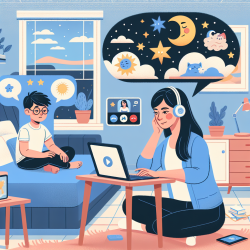As practitioners dedicated to improving the lives of children with autism spectrum disorder (ASD), it's crucial to stay updated with the latest research and implement data-driven interventions. A recent study titled Protocol for targeting insomnia in school-aged children with autism spectrum disorder without intellectual disability: a randomised control trial provides valuable insights that can enhance our therapeutic approaches. This blog will summarize the study's key findings and suggest ways to integrate these outcomes into practice.
Understanding the Study
The study focused on children aged 6-12 with ASD and insomnia. It aimed to evaluate the efficacy of Cognitive Behavioral Therapy for Childhood Insomnia (CBT-CI) adapted for children with ASD. The trial compared two delivery modes: in-person and remote, against a control group receiving Sleep Hygiene and Related Education (SHARE).
Key Findings
- CBT-CI Efficacy: Both in-person and remote CBT-CI significantly improved sleep outcomes and reduced physiological arousal in children with ASD.
- Remote Delivery: Remote CBT-CI was found to be as effective as in-person therapy, making it a viable option for families in underserved or rural areas.
- Parent and Child Benefits: Improvements were observed not only in children's sleep patterns but also in parents' sleep and daytime functioning, highlighting the holistic benefits of the intervention.
Practical Applications
To enhance your practice, consider the following applications based on the study's findings:
- Implement CBT-CI: Incorporate CBT-CI techniques such as sleep hygiene, stimulus control, and relaxation training into your therapy sessions. These techniques have been shown to improve sleep outcomes in children with ASD.
- Leverage Remote Therapy: Utilize telehealth platforms to deliver CBT-CI, especially for families who face barriers to accessing in-person services. The study's findings support the efficacy of remote therapy, ensuring that children receive consistent and effective treatment.
- Holistic Approach: Address both child and parent sleep issues. Educate parents on sleep hygiene and relaxation techniques, and provide support to reduce their stress and improve their sleep, thereby creating a positive environment for the child.
Encouraging Further Research
While the study offers promising results, it also underscores the need for continued research. Practitioners are encouraged to:
- Participate in Studies: Engage in or support ongoing research efforts to validate and expand the findings of this study.
- Share Insights: Document and share your experiences and outcomes with CBT-CI and remote therapy to contribute to the growing body of evidence-based practices.
By integrating these research-backed strategies into your practice, you can significantly improve the sleep and overall quality of life for children with ASD and their families.
To read the original research paper, please follow this link: Protocol for targeting insomnia in school-aged children with autism spectrum disorder without intellectual disability: a randomised control trial.










